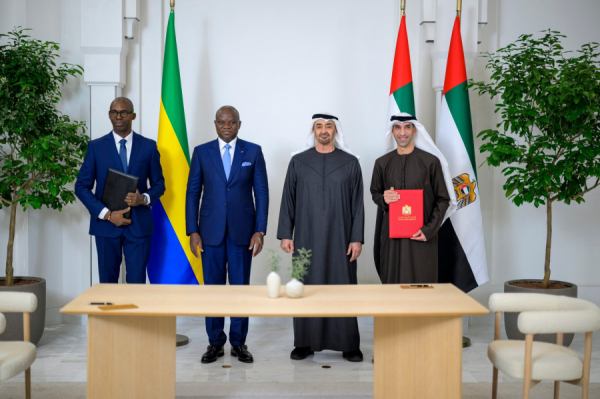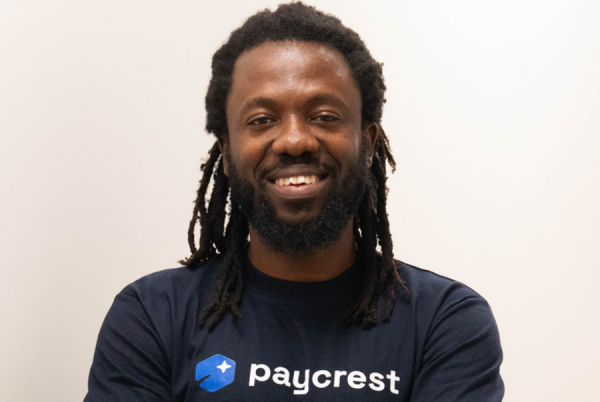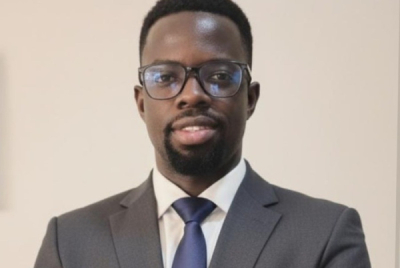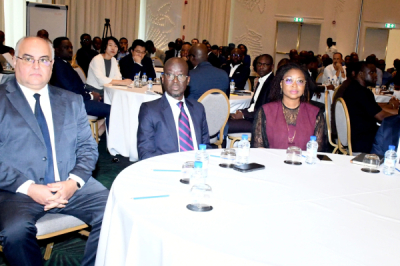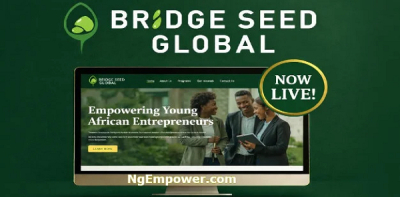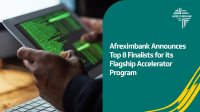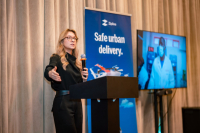- Gabon signed a memorandum of understanding with Presight, a subsidiary of UAE-based G42, to support digital government reforms.
- The partnership focuses on artificial intelligence, advanced analytics, and big data for public administration.
- Presight already works with African governments and trades on the Abu Dhabi Securities Exchange.
Gabon’s Ministry of Digital Economy signed a memorandum of understanding with Presight on Friday, February 6, on the sidelines of high-level discussions held in Abu Dhabi. Presight operates as a subsidiary of UAE-based technology group G42. The agreement aims to support the digital transformation of public administration and several strategic state services.
À Abu Dhabi, le Gabon a signé trois Mémorandums d’Entente stratégiques dans les secteurs minier, numérique et logistique.
— Présidence de la République Gabonaise (@PresidenceGA) February 6, 2026
Ces accords s’inscrivent dans la vision du Président de la République, S. E. @oliguinguema, visant à accélérer la transformation économique et renforcer… pic.twitter.com/hkZcUEH6bP
Authorities said the cooperation will focus on deploying artificial intelligence, advanced analytics, and big data solutions. The partnership seeks to improve public data management, optimize administrative services, and strengthen decision-support capabilities. Governments typically use such solutions to modernize state information systems, automate selected processes, and improve service delivery to citizens and businesses.
This partnership comes as digital transformation ranks among Gabon’s top policy priorities. DataReportal said Gabon recorded about 1.8 million internet users in 2025, representing nearly 71.9% of the population, while mobile connections exceeded 3.27 million. However, public service digitalization and nationwide data governance remain key challenges for improving administrative efficiency and supporting economic diversification.
Presight operates across multiple markets and has already formed partnerships with governments and institutions in Africa, including in Gambia and Côte d’Ivoire, on projects related to artificial intelligence, security, and public data management. The company trades on the Abu Dhabi Securities Exchange and positions itself as a major exporter of AI solutions developed in the United Arab Emirates.
With this memorandum, Libreville and Presight have laid the groundwork for cooperation expected to take shape in the coming months. Future operational agreements will define project scope, implementation modalities, and associated investments, as Gabon seeks to build a more coherent digital strategy aligned with its public sector modernization priorities.
Samira Njoya
-
Nigerian entrepreneur Chibuotu Amadi co-founded Paycrest to bridge cryptocurrencies and local fiat payments.
-
Paycrest enables instant crypto-to-fiat transactions using a liquidity provider network with reduced costs.
-
Amadi brings experience from Web3, fintech, and decentralized health platforms to the payment infrastructure.
Chibuotu Amadi is a Nigerian entrepreneur and software engineer. He co-founded and leads Paycrest as chief executive officer. Paycrest operates a payment infrastructure that seeks to make cryptocurrency transactions as simple and accessible as traditional payments for individuals and businesses worldwide.
Founded in 2024, Paycrest targets financial inclusion by enabling seamless payments between digital currencies and local fiat money. The company aims to lower transaction costs, simplify processes, and remove frictions linked to daily cryptocurrency use.
Paycrest offers open tools that allow users to send or receive payments in cryptocurrencies while settling or collecting local currency through standard bank accounts and wallets. Behind the platform, a network of liquidity providers converts value instantly between digital assets and traditional currencies at reduced cost. The tools target individuals, online merchants, enterprises, and decentralized finance projects.
Amadi has built multiple ventures over the past decade. In 2014, he founded SMSLeak, a Nigerian bulk SMS company that provides large-scale messaging solutions for advertising, sales promotions, product launches, and customer engagement.
In 2018, he co-founded Cura Network and served as chief technology officer until 2022. The company develops a decentralized global healthcare system that connects entities to collaborate and share data to promote, restore, and maintain health.
Amadi graduated from the University of Benin in Nigeria, where he earned a bachelor’s degree in computer engineering in 2016. He completed a software engineering internship at the Manipal Institute of Technology in India in 2015.
In 2019, Amadi joined Indian financial firm Inkredo as a full-stack developer. At the same time, he worked at Smarter.Codes, a software development company. In 2020, he joined U.S.-based ConsenSys, which provides tools for building Web3 solutions. From 2021 to 2023, he held a similar role at Gitcoin, a U.S. organization that funds community-driven projects.
This article was initially published in French by Melchior Koba
Adapted in English by Ange J.A de BERRY QUENUM
-
Ivorian entrepreneur Yoann Eddy Assohoun founded Tanga Africa to digitize visitor and crowd management for organizations and events.
-
Tanga Africa replaces manual visitor logs with automated digital tools that improve security, tracking, and data analysis.
-
Assohoun combines entrepreneurship with senior technical roles across African and international tech firms.
Yoann Eddy Assohoun is an Ivorian software developer and entrepreneur. He founded and leads Tanga Africa, a technology company that specializes in digital visitor and crowd management for organizations and events.
Founded in 2024, Tanga Africa targets security firms and organizations that seek to modernize visitor reception across multiple environments, including offices, hospitals, schools, and professional or cultural events. The company offers a digital platform that replaces paper registers and manual processes with automated tools.
The solution enables digital visitor registration and delivers faster check-ins, improved security, and optimized on-site tracking. Through an intuitive interface, Tanga Africa improves reception experiences and simplifies crowd management. The platform automates access control, entry and exit traceability, and report generation, which allows organizations to analyze peak attendance periods.
The company also offers event-specific features. These tools include RSVP management, QR-code self check-in, and real-time monitoring systems that support smoother and more professional event organization.
Alongside his role at Tanga Africa, Assohoun serves as chief technology officer at Etudesk. The startup supports access to educational technology solutions for schools across West Africa.
Before launching Tanga Africa, Assohoun co-founded Expat Orientation in 2018 and led the company until 2022. The agency assisted students who pursued higher education in Bangalore, India. In 2023, he also co-founded the Ivorian fintech doo!, where he served as chief technology officer.
Assohoun graduated from Bangalore University, where he earned a bachelor’s degree in computer science in 2015. He later completed a master’s degree in the same field at Presidency College in 2019.
In 2019, he joined Nexshore Technologies in India as a junior full-stack developer and designer. In 2020, he joined U.S.-based Akil Technologies as a frontend developer. He later joined Ghanaian fintech Noworri as a full-stack web engineer and earned promotion to chief technology officer in 2022.
From 2022 to 2025, Assohoun served as national director of PAL in Ghana, a payment processing system that targets Francophone West African businesses and emerging economies. During 2024 and 2025, he also worked as a software engineer and technical lead at INCUBTEK, an Ivorian firm that specializes in consulting, business incubation, and technological innovation.
This article was initially published in French by Melchior Koba
Adapted in English by Ange J.A de BERRY QUENUM
- Nigerian startup Timon offers an all-in-one financial app for travelers, students, and remote workers living across borders.
- The platform provides multi-currency wallets, global payment cards, eSIM services, and money transfers in over 100 countries.
- The mobile app has surpassed 50,000 downloads on Android since its 2023 launch.
Timon operates as a digital solution developed by a Nigerian startup. The company designed the product for frequent travelers, international students, remote workers, and users who adopt a borderless lifestyle. Founders Oluwatomi Olarinde and Chizaram Ucheaga launched the startup in 2023.
At the core of Timon’s offering, a mobile application combines multiple financial services. The app allows users to create and manage multi-currency wallets, including naira and U.S. dollars. The platform also provides physical and virtual payment cards that users can access in more than 100 countries. In addition, the app integrates complementary services such as international eSIMs and money transfers. Timon offers the application on iOS and Android, where downloads have exceeded 50,000, according to Google Play Store data.
“We comply with local and international financial regulations, use advanced fraud prevention systems, and apply industry-standard encryption to protect your funds and personal information at all times,” the startup said.
Through the mobile platform, users can pay online or in stores, plan trips, activate cards instantly, and convert stablecoins into spendable currencies. Timon targets a seamless user experience through transparent fees, rapid service deployment, and an interface designed for globally mobile African users and diaspora communities.
By combining financial management, global connectivity, and universal payment cards, the Nigerian fintech positions itself as a digital financial passport for 21st-century travelers, digital nomads, and mobile professionals.
This article was initially published in French by Adoni Conrad Quenum
Adapted in English by Ange J.A de Berry Quenum
-
Benin launched consultations to draft a national digital strategy covering the period through 2031.
-
Authorities prioritized nationwide internet coverage, e-government expansion, and artificial intelligence development.
-
The strategy builds on reforms since 2016 that expanded fiber infrastructure and digital public services.
Benin launched a policy design process to develop its Digital Strategy through 2031. Key public and private sector stakeholders met in Cotonou on February 5, and Friday, February 6, during a strategic workshop that formally initiated work on the medium-term digital policy roadmap.
Participants focused discussions on several priorities. Stakeholders examined the expansion of internet coverage across the entire territory. Participants also assessed public service modernization through e-services and reviewed the deployment of emerging technologies, including artificial intelligence, in high-potential sectors. In addition, participants analyzed the alignment between local digital skills and labor market needs, as well as financing mechanisms required to implement the future strategy.
Authorities anchored the new roadmap in reforms launched since 2016. These reforms enabled the deployment of more than 3,000 kilometers of fiber-optic infrastructure. The reforms also improved nationwide connectivity, established the National Register of Natural Persons, and launched more than 250 digital public services. These advances positioned Benin among Africa’s top performers in the 2025 GovTech Maturity Index, alongside Algeria, South Africa, and Nigeria.
Despite this progress, authorities still face several challenges. Gaps in internet access persist in some areas. Limited adoption of digital services by parts of the population remains a constraint. The economy also requires deeper integration of artificial intelligence technologies. Through the forthcoming strategy, authorities aim to consolidate reforms, accelerate digital inclusion, and turn the digital sector into a sustainable engine of economic growth and structural transformation by 2031.
This article was initially published in French by Samira Njoya
Adapted in English by Ange J.A de BERRY QUENUM
Bridge Seed Global has opened applications for its 2026 accelerator programme targeting African founders aged 18 to 35. Selected projects will receive $5,000 in non-dilutive funding over a three-month programme, along with structured support, one-on-one mentoring and access to an investor network. The curriculum focuses on business models, market strategy and investment readiness, and the programme will conclude with a Demo Day. Applications are open until Friday, Feb. 20.
Afreximbank has selected eight African startups for the inaugural edition of its acceleration programme, aimed at boosting innovation to support intra-African trade. The startups were chosen from more than 1,600 applicants and are based in countries including Nigeria, Egypt, Ethiopia and Côte d’Ivoire. Participants will take part in a three-month mentoring and training programme and will gain access to the bank’s network, as well as potential equity investment.
WhatsApp is testing a new feature that would allow users to share status updates exclusively with a “close friends” group, similar to Instagram’s functionality. Users would be able to create and name custom contact lists for this purpose, which could be reused without having to adjust privacy settings for each update. Status updates shared with this restricted group would be marked by a different-colored ring, indicating that the content is intended for a more private audience.
-
Addvocate uses artificial intelligence to improve sales productivity and decision-making.
-
The platform automates preparation, follow-up and CRM synchronization for sales teams.
-
Founder Ridha Mami brings a background in finance and international enterprise software sales.
Ridha Mami is a Tunisian technology entrepreneur with a background in finance. He serves as founder and chief executive officer of Addvocate, a platform that helps sales teams improve performance through artificial intelligence.
Founded in 2024, Addvocate provides AI-assisted conversations that help teams prepare for and conduct prospect interactions more effectively. The platform also delivers automation tools that reduce repetitive tasks. The system qualifies leads with precision to focus effort on high-potential opportunities and ensures seamless synchronization with existing customer relationship management tools.
Addvocate centralizes key information from sales tools, call reports and customer management systems. The platform delivers personalized summaries ahead of meetings, proposes relevant questions and suggests next steps. The system then supports the entire meeting lifecycle through recording, post-meeting summaries, customer follow-up and automated transitions between preparation and follow-up.
The platform also integrates Nudge, its flagship customer relationship management tool. The solution helps sales teams track deals and make informed decisions using real-time data. Nudge operates in full synergy with Addvocate. Together, the tools provide a clear view of sales performance and recommend concrete actions that support deal closure.
Ridha Mami earned a master’s degree in international finance in 2010 from the Institut des Hautes Études Commerciales de Carthage in Tunisia. He began his career the same year at Club Med, a French resort operator, where he worked as a key accounts manager.
In 2012, he joined Vocalcom in France, a cloud-based contact center software provider powered by artificial intelligence, as international sales manager. Four years later, he became strategic sales director at French software company Contentsquare. From 2022 to 2024, he worked at Wonderflow, a generative AI company specializing in voice-of-customer analytics, where he successively held roles as account executive, sales director for Europe and North America, and vice president of sales.
This article was initially published in French by Melchior Koba
Adapted in English by Ange J.A de BERRY QUENUM
-
Rwanda signed an expansion agreement with Zipline to build a national autonomous drone delivery network.
-
The deal includes Africa’s first urban drone delivery system and a new long-range distribution hub.
-
Zipline plans to establish its first international AI and robotics testing center in Rwanda.
Rwanda signed a strategic expansion agreement with Zipline on Thursday, February 6, to become the first country globally to operate a national autonomous drone delivery network, including Africa’s first urban drone delivery system. The agreement forms part of a $150 million grant awarded to Zipline by the U.S. Department of State, with Rwanda acting as the first beneficiary.
“The Rwanda-Zipline partnership has worked for years to deploy technology in service of our people. We have seen the extraordinary impact of drone delivery by saving time, saving money and saving lives. Through this partnership, we will now expand urban delivery and extend these benefits to even more communities,” said Paula Ingabire, Rwanda’s Minister of ICT and Innovation.
Rwanda will become the first African country to deploy Zipline’s urban delivery system, Platform 2. The technology enables fast, quiet and highly precise deliveries in dense urban environments such as Kigali, which accounts for nearly 40% of national healthcare demand. Zipline already operates the platform in the United States, where it delivers tens of thousands of retail and grocery items directly to homes and public locations.
The agreement also includes reinforcement of the existing delivery network through the opening of a third long-range distribution center in Karongi district, complementing the Muhanga and Kayonza hubs. This infrastructure will extend delivery coverage beyond the Nyungwe forest toward districts bordering the Democratic Republic of Congo, thereby improving territorial equity in access to essential medical products.
Beyond logistics, Zipline plans to establish its first international testing center dedicated to artificial intelligence and robotics in Rwanda. The research and development facility will test new safety systems, next-generation logistics software and aircraft performance under varied climate conditions. The center will also support local talent development and create highly skilled jobs in advanced technologies.
The new agreement builds on a long-term partnership between Rwanda and Zipline. The U.S. company has operated in Rwanda since 2016 and has renewed its partnership several times, including a $61 million contract signed in December 2022. That contract targets expanded delivery sites in rural and urban areas, with plans to triple volumes and reach nearly 2 million deliveries by 2029, covering more than 200 million kilometers flown by autonomous drones.
According to company data, the partnership has contributed to a 51% reduction in maternal mortality in covered areas. The real-time integration of delivery data into national health and emergency systems has also strengthened epidemiological surveillance and crisis response capacity.
This article was initially published in French by Samira Njoya
Adapted in English by Ange J.A de BERRY QUENUM
More...
-
Glamera provides end-to-end digital management for beauty establishments of all sizes.
-
The platform integrates booking, payments, customer data and staff scheduling.
-
Founder Mohamed Hassan Hijazi brings a background in accounting and serial entrepreneurship.
Mohamed Hassan Hijazi is a trained accountant and an Egyptian serial entrepreneur. He serves as chief executive officer of Glamera, a digital platform for beauty professionals that he co-founded in 2019 with Omar Fathy and Zafer Al-Sheri.
Glamera delivers a specialized solution that manages all activities across the beauty sector. Small businesses and large chains both use the platform. The system adapts to each establishment by offering multiple plans that combine core services with additional features.
The platform provides a seamless flow from appointment booking to payment. The system aims to give businesses the tools to respond quickly to demand, organize schedules and track services without friction.
To simplify operations for professionals and customers, Glamera integrates multiple payment options. Users can manage online payments, deposits, and the issuance of receipts and invoices. The platform also enables the creation of promotional codes and gift cards to support sales campaigns and strengthen customer loyalty.
Glamera also focuses on leveraging customer data to support long-term relationships. The system stores relevant information that allows businesses to follow up with clients, encourage repeat visits and reinforce engagement. Beyond customer management, the platform supports daily team operations through a scheduling module that manages working hours, shifts, leave and breaks.
In 2009, Mohamed Hassan Hijazi co-founded Sibar Factory for Food Packaging, a company specializing in food packaging. He also co-founded Smart Zone in 2018, a venture studio that creates, incubates and scales technology-driven companies. In 2020, he contributed to the launch of EduraApp, an education platform that connects teachers and students.
Hijazi graduated from Suez Canal University in 2007 with a bachelor’s degree in accounting and business administration. He began his professional career in 2008 as an accountant at Sawary Al-Tameer for Construction, a construction company.
This article was initially published in French by Melchior Koba
Adapted in English by Ange J.A de BERRY QUENUM
-
Chad mandated Techso Group to secure and certify its national data center before launch.
-
Authorities linked the project to cybersecurity risks and the “Chad Connection 2030” strategy.
-
International rankings continue to place Chad among the weakest performers in cybersecurity and e-government.
Chadian authorities assigned Techso Group the task of securing the national data center ahead of its launch. A tripartite agreement was signed on February 5, between the company, the Agency for ICT Development (ADETIC) and the National Agency for Information Security and Electronic Certification (ANSICE).
The partnership covers a security audit and the certification of the site and its equipment to ensure compliance with current standards for critical infrastructure protection. “This aims to guarantee the reliability, integrity and resilience of the national data center,” said Nadjma Saleh Kebzabo, deputy director general of ANSICE.
The agreement also provides for the operational deployment of 100 micro data centers across government institutions. “Interconnected with the national data center, these systems will establish a unified, secure and high-performance digital architecture to support the dematerialization of administrative procedures and improve public service quality,” ADETIC said in a statement.
Authorities launched the initiative amid what they described as “growing challenges related to cybercrime and the protection of sensitive data.” Digital transformation continues to accelerate across Africa as governments integrate information and communication technologies to support socio-economic development. Chad, for example, places digital technology at the core of its national development plan known as “Chad Connection 2030.”
The plan includes $1.5 billion in digital investments. Authorities aim to position the country among Africa’s leading digital economies and significantly expand network coverage to connect most of the population. The program also targets the digitization and interconnection of all public and para-public services to provide full access to e-government services. Authorities also list digital inclusion among their priorities.
However, the International Telecommunication Union said cybersecurity remains a prerequisite for countries seeking to fully leverage ICT opportunities for development. The organization ranked Chad in the second-lowest category, Tier 4, in its 2024 Global Cybersecurity Index. Chad recorded relatively strong results in regulatory frameworks and cooperation but must intensify efforts in technical measures, organizational capacity and skills development.
For now, Chad ranks 189th out of 193 countries in the United Nations E-Government Development Index, with a score of 0.1785 out of 1. The country remains below the African average of 0.4247 and the global average of 0.6382.
This article was initially published in French by Isaac K. Kassouwi
Adapted in English by Ange J.A de BERRY QUENUM
-
Onafriq and PAPSS launched a pilot for local-currency payments from Nigeria to Ghana.
-
The partnership bypasses the dollar to reduce costs and speed up cross-border trade.
-
The initiative supports AfCFTA implementation and intra-African commerce growth.
On February 2, Onafriq Nigeria Payments, a fintech licensed by the Central Bank of Nigeria, announced a partnership with the Pan-African Payment and Settlement System. The partnership pilots a service that allows users to send money from a wallet or bank account in Nigeria to a beneficiary in Ghana. The initiative aims to facilitate payments between the two countries in local currencies without using the dollar in order to support intra-African trade under the African Continental Free Trade Area.
PAPSS, which AfCFTA authorities adopted as a reference platform for implementation, operates as a shared infrastructure that routes and settles payments between African banks, fintechs and mobile money operators. The platform offers an alternative to traditional correspondent banking networks, which often impose higher costs and longer settlement times for cross-border payments. By relying on this platform, Onafriq converts connected mobile wallets and bank accounts into access points to a pan-African real-time payment network.
Today, a small or medium-sized enterprise that imports from Ghana to Nigeria or exports in the opposite direction typically uses international banking channels. These channels impose multiple layers of fees, processing delays that stretch over several days, and near-systematic conversion through the dollar or the euro. These constraints weigh more heavily on small firms, which face limited capacity to absorb foreign exchange costs and payment delays.
The Onafriq–PAPSS pilot offers near-instant local-currency payments between Nigeria and Ghana through familiar wallet and banking application interfaces. Mxolisi Msutwana, managing director for Anglophone West Africa at Onafriq, said: “This is how we open bidirectional trade corridors, reduce costs for businesses and empower African enterprises to trade confidently in their own currency. The vision is continental, but it starts with concrete actions like this.”
Ositadimma Ugwu, chief information officer at PAPSS, added: “With this move, we challenge this mindset by enabling Nigerians to send money to their neighbors as easily as they send a text message.”
A Key Component of AfCFTA Implementation
According to Afreximbank’s Africa Trade Report 2025, intra-African trade reached $220.3 billion in 2024, representing a 12.4% increase from 2023. The figure remains below the estimated potential of $296.3 billion. The report states that AfCFTA can help close this gap if countries also strengthen financial infrastructure. In this context, solutions such as PAPSS, combined with private mass-payment networks, represent practical tools to convert trade agreements into real transactions and support AfCFTA implementation.
“The Pan-African Payment and Settlement System reduces dependence on foreign currencies and improves the efficiency of intra-African trade, while national digital payment ecosystems expand rapidly and generate billions of dollars in annual revenues,” Afreximbank said in the report.
This article was initially published in French by Melchior Koba
Adapted in English by Ange J.A de BERRY QUENUM
-
Ivory Coast plans to regulate and organize digital content monetization by 2026.
-
The government opened talks with regulators and industry partners to define revenue-sharing mechanisms.
-
Streaming growth highlights rising economic stakes but exposes persistent income gaps for artists.
The Ivorian government announced its intention to make digital content monetization effective by 2026 in response to demands from cultural, music and media stakeholders. Culture and Francophonie Minister Françoise Remarck opened discussions on February 2, with the High Authority for Audiovisual Communication (HACA) and several sector partners to define mechanisms to valorize locally produced digital content.
The initiative seeks to establish a regulatory and operational framework to capture and redistribute a significant share of revenues generated from online listening, music streaming, video and audiovisual content. The executive branch aims to structure an ecosystem in which local and international digital platforms compensate artists and creators under clear rules while authorities strengthen copyright regulation and distribution contracts.
The issue carries growing economic weight. The International Federation of the Phonographic Industry said in its Global Music Report 2025 that sub-Saharan Africa recorded a 22.6% increase in recorded music revenues in 2024, reaching a record $110 million, or nearly five times the global growth rate of 4.8% over the same period.
In Ivory Coast, music streaming platforms such as Boomplay, Spotify, Apple Music and Deezer continue to expand their user bases. Compensation models vary across platforms and markets. By way of indication, one million streams on Spotify can generate about CFA1.2 million, or roughly $2,155, for rights holders, highlighting both the economic potential of streaming and persistent revenue disparities.
Despite expanding digital audiences, monetization remains limited for many artists in Francophone Africa. Contract structures and regulatory frameworks continue to allow a significant share of value creation to escape local creators.
The Ivorian initiative also aligns with a broader push to develop the national digital economy. The country benefits from relatively solid mobile infrastructure. Fourth-generation network coverage reached 76.88% in the first quarter of 2025, improving access to digital services and content distribution platforms.
By structuring digital content monetization, Abidjan aims to integrate the creative economy more fully into the formal sector, strengthen revenues for local artists and producers, and position digital culture as a driver of economic growth and employment as streaming and digital content markets continue to expand across Africa.
This article was initially published in French by Samira Njoya
Adapted in English by Ange J.A de BERRY QUENUM


